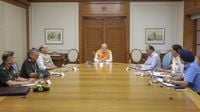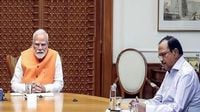As tensions remain high between India and Pakistan following Operation Sindoor, National Security Advisor Ajit Doval met with Prime Minister Narendra Modi in Delhi to brief him on the evolving security situation. The meeting, held on May 8, 2025, came a day after India launched a military operation targeting terror bases across the border. Sources confirmed that Doval provided a detailed update on cross-border developments and India’s defensive preparedness amid reports of continued Pakistani shelling and drone activity near sensitive regions.
In parallel, Defence Minister Rajnath Singh is holding a separate high-level review with the Chief of Defence Staff and the three service chiefs. The meeting is focused on assessing India’s operational readiness and response strategies as the situation along the western border remains volatile. Defence installations across Jammu and Kashmir have been placed on heightened alert as surveillance and missile defence operations are stepped up to neutralise incoming threats targeting civilian and strategic assets.
In a significant escalation, Pakistan launched a coordinated offensive in Jammu and Kashmir just hours after its failed attempt to target 15 Indian cities. Heavy shelling has been reported across the Line of Control and the International Border, including RS Pura, Arnia, Samba, and Hiranagar. Jammu, the region’s winter capital, is now facing aerial threats. India’s air defence systems successfully intercepted eight missiles aimed at RS Pura, Arnia, Samba, and Hiranagar, areas with dense military infrastructure. Meanwhile, Pathankot, a key defence hub located just 30 km from the International Border in Punjab, has come under intense artillery fire.
During the meeting with Modi, which lasted for about half an hour, Doval also briefed the Prime Minister about the reactions India is receiving from abroad following Operation Sindoor. Doval is believed to have informed Modi that Indian armed forces are well prepared to give prompt and strong responses to any misadventure being conducted by Pakistan. The support from international allies has been notable, with countries like the US, UK, France, Netherlands, and Israel expressing their backing for India’s fight against terrorism.
As per central government data, Pakistan has resorted to indiscriminate firing on civilians living along the international border, resulting in civilian casualties. Reports indicate that 13 civilians have lost their lives in shelling launched by Pakistan in the Poonch sector, with 59 others injured. The situation has prompted Home Secretary Govind Mohan to meet with Prime Minister Modi and provide a detailed report on India’s internal security.
The home ministry has directed all district collectors along the border areas with Pakistan to coordinate with army and central security agencies. Home Minister Amit Shah emphasized the need for ensuring arrangements for the smooth operation of essential services like hospitals and fire brigades, as well as the uninterrupted supply of essential goods in border states. He also instructed that the State Disaster Response Force (SDRF), Civil Defence, and Home Guards remain on alert to deal with any situation.
In a broader context, Lieutenant Governors of Jammu and Kashmir and Ladakh, along with Chief Ministers from various states including Uttar Pradesh, Uttarakhand, Punjab, Rajasthan, Gujarat, and West Bengal, were present in a meeting convened by Shah. The discussions focused on the ongoing situation and the necessary precautions required to ensure public safety.
The escalation in tensions follows a series of artillery strikes, drone incursions, and missile attacks launched by Pakistan targeting multiple locations in Jammu, Rajasthan, and Punjab, just a day after India executed strikes on terror hideouts in Pakistan and Pakistan-occupied Kashmir (PoK). Security agencies reported that Pakistan fired eight missiles, all of which were successfully intercepted by the S-400 air defence system.
In light of the aerial attacks, several regions in states like Jammu and Kashmir, Punjab, Gujarat, and Rajasthan have been blacked out. Many states have announced the closure of schools, implemented blackouts in border districts, and cancelled leave for police personnel and administration officials. Flight operations at Bikaner, Kishangarh in Ajmer, and Jodhpur airports have been suspended until May 10 as a precautionary measure, with directions issued to tighten security arrangements across the state.
Satellite images obtained reveal heavy damage to Jaish-e-Mohammed's major training and recruitment centres in Pakistan following Indian airstrikes carried out on May 7, 2025. The visuals underscore the pinpoint accuracy of the strikes conducted early Wednesday. The Indian government has stated it will react strongly to any misadventure by Pakistan, with the Armed Forces clarifying that only terrorist camps were targeted, not civilian or military facilities.
As the situation continues to unfold, explosions and blasts have been heard in Lahore, causing panic among residents, particularly near Walton Airport in Gopal Nagar and Naseerabad. These sounds may be related to a Pakistani military exercise involving the Air Force and Lahore Corps. This incident occurs in the context of recent precision strikes by India at multiple locations across Pakistan, including areas close to Lahore.
With both nations on high alert, the coming days will be critical in determining the trajectory of this escalating conflict. The Indian government’s robust response to Pakistan’s actions, coupled with international support, suggests a complex and tense situation ahead.






